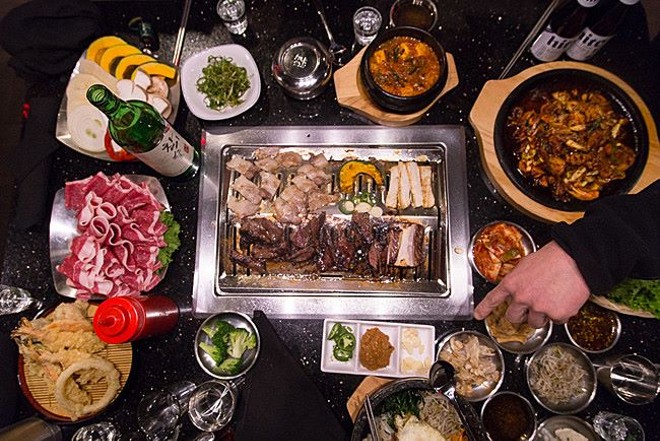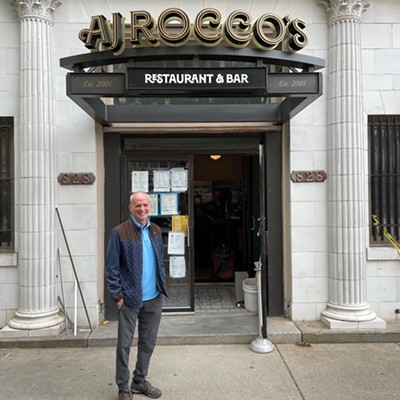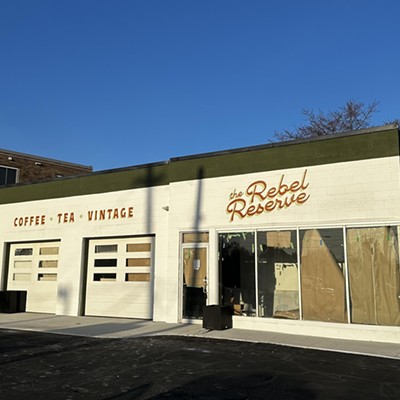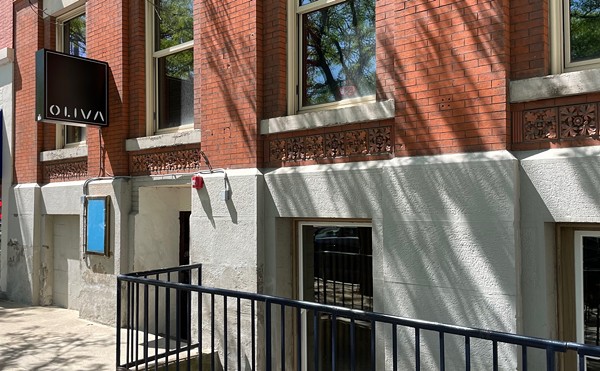For Cleveland's Asia Town, Statewide Orders, Barriers to Resources and Coronavirus Stigmas Have Proved a Devastating Combination
By Hannah Miao on Tue, May 5, 2020 at 3:03 pm
[
{
"name": "Ad - NativeInline - Injected",
"component": "38482495",
"insertPoint": "3",
"requiredCountToDisplay": "5"
},{
"name": "Real 1 Player (r2) - Inline",
"component": "38482494",
"insertPoint": "2/3",
"requiredCountToDisplay": "9"
}
]
When it comes to quintessential Cleveland restaurants, AsiaTown’s Li Wah tops the list. Since 1991, the family-run establishment has provided Northeast Ohio with the best dim sum in the region. Longtime neighborhood residents, dedicated foodies and families from satellite suburbs regularly flock to the corner of Payne and East 30th for its signature Chinese cuisine.
Before the coronavirus pandemic shutdown, diners gathered around Li Wah’s large, circular tables and sipped hot tea between bites. Aunties pushing carts of food shouted names of dishes in Cantonese, pausing intermittently to place a plate of dumplings or a steaming basket of buns on a nearby lazy Susan. Golden, roasted duck hanging in a display near the entrance enticed passersby in the Asia Plaza shopping center.
Like most local businesses, Li Wah has been severely impacted by the governor’s stay-at-home order. “Li Wah is a 95% dine-in business and only 5% gets carry-out,” manager Ed Hom said. Normally open 365 days a year, the restaurant had to close on weekdays for a period and now operates daily on adjusted takeout hours.
“I miss talking to the customers,” said Hom. “We have many long term customers. You get to know the grandparents, the children, the grandchildren. Once you develop that relationship, it’s something special.”
While all small businesses in Cleveland are feeling the impacts of the coronavirus crisis, Asian American restaurateurs and merchants have been hit even harder.
Many began experiencing the effects of the pandemic much earlier than the March 23 shutdown. For Li Wah and other AsiaTown establishments, Lunar New Year is typically the busiest time of the year. This year was different. Concerns about the coronavirus outbreak originating in China permeated the festivities. Despite no reported cases in Ohio at the time, AsiaTown business owners saw fewer visitors than expected this holiday season.
Soon after Lunar New Year ended in early February, Hom started to notice a significant drop in customers. By late February, Li Wah’s revenue was down by around 40%.
Lisa Wong, president of OCA Greater Cleveland Asian Pacific American Advocates, points to an increase in xenophobia and anti-Asian racism during the coronavirus pandemic. “On top of this virus, our leadership is using terms like ‘Chinese virus,’ ‘Wuhan virus,’ ‘Kung flu.’ We shouldn’t use these terms that incite hate.”
Wong had to confront a local restaurant owner who used the term “Chinese virus” and a cleveland.com reporter whose article referred to COVID-19 as the “China coronavirus.” She noted that the Center for Disease Control and Prevention and the World Health Organization warn against using geographic location when naming diseases because it could stigmatize populations associated with the area.
The stigma has not only caused a spike in anti-Asian hate incidents, but also has stoked a fear of Asian-owned businesses. The Cuyahoga County Board of Health received numerous calls from residents who falsely believed that eating at an Asian restaurant could expose them to the virus, though there has been no evidence of coronavirus transmission through food or food packaging.
In mid-March, the health department issued a flyer to post at local Asian restaurants that assured customers that the restaurants are routinely inspected and safe. It also stated, “Due to COVID-19/coronavirus, people may think that eating at an Asian restaurant or meeting with Asian people is risky to their health. This is false and unfairly disrespects Asian-Americans.”
Still, the misconceptions persist. Karis Tzeng, AsiaTown project manager for MidTown Cleveland, noted, “Even at one of the safety meetings of the police district, somebody mentioned a worry about going to the Asian grocery stores because of an increased likelihood of contracting coronavirus. It’s been over two and a half months that the fear has been there.” While larger supermarkets have become packed with customers stocking up on groceries, many local Asian grocery stores remain empty in comparison.
Though emergency funds and stimulus packages exist to assist struggling small businesses, these resources are inaccessible to many Asian business owners. Information and applications for these funding sources are often only available online and in English. For those who are non-native English speakers and less technologically savvy, the process can be especially daunting.
Anna Li, owner of Anna Beauty Center on Superior Avenue, has been unable to apply for aid to assist her business during the shutdown. “I am not good with computers and I do not understand the forms they ask for,” she said. Li communicates primarily in Chinese and her English is limited.
With a lack of accessible aid, some owners have tried out alternative business strategies. Several Asian grocery stores have turned to WeChat, a Chinese mobile messaging platform, to organize weekly grocery drop-offs to various Chinese communities in the Greater Cleveland area.
Li has also attempted to coordinate beauty product deliveries to longtime customers via WeChat, though she hasn’t seen much success. With everyone staying indoors, most customers have decided to forego beauty products.
It’s difficult to predict the long term effects of the pandemic on the Asian American community in Cleveland. “Forty-percent of AsiaTown restaurants have temporarily closed,” said Wong. “The question is how many are going to be able to open back up and run business again after this.”
How elected officials and community leaders respond to Asian American small business owners during this time of the crisis may also have profound implications for the 2020 census and November elections.
The same digital divide and language barriers that prevent small business owners from applying for emergency relief hold true for the census and voting in the Asian American community. Tzeng notes that AsiaTown residents are historically less likely to complete the census online. Comprehensive language translation and targeted outreach are necessary to keep community members informed.
Moreso, how much individuals feel the government is effectively responding to their needs will affect their motivation to participate civically. “When you’re doing voter engagement or census outreach, it’s not really just about the election or accurate census, it’s about this more long term goal of having a community that feels like they have some power over their lives,” said Tessa Xuan, chair of the grassroots organization Ohio Progressive Asian Women's Leadership. “It’s a long process to get to that point.”
For now, local community members are rallying to support businesses that have been left behind. OPAWL launched a social media campaign called #IWillEatWithYou to encourage people to buy takeout or groceries from Asian-owned businesses and enjoy a meal with loved ones through Zoom, Facetime, a phone call or other options. Participants have ordered carryout from restaurants like Li Wah and posted images of their virtual meals with the hashtag.
“We wanted to show solidarity with these small business owners and to emphasize that it’s still important to eat together,” said Xuan. “Caring for each other and having a more collective mindset is what we’re going to need to survive and get through the pandemic.”
Before the coronavirus pandemic shutdown, diners gathered around Li Wah’s large, circular tables and sipped hot tea between bites. Aunties pushing carts of food shouted names of dishes in Cantonese, pausing intermittently to place a plate of dumplings or a steaming basket of buns on a nearby lazy Susan. Golden, roasted duck hanging in a display near the entrance enticed passersby in the Asia Plaza shopping center.
Like most local businesses, Li Wah has been severely impacted by the governor’s stay-at-home order. “Li Wah is a 95% dine-in business and only 5% gets carry-out,” manager Ed Hom said. Normally open 365 days a year, the restaurant had to close on weekdays for a period and now operates daily on adjusted takeout hours.
“I miss talking to the customers,” said Hom. “We have many long term customers. You get to know the grandparents, the children, the grandchildren. Once you develop that relationship, it’s something special.”
While all small businesses in Cleveland are feeling the impacts of the coronavirus crisis, Asian American restaurateurs and merchants have been hit even harder.
Many began experiencing the effects of the pandemic much earlier than the March 23 shutdown. For Li Wah and other AsiaTown establishments, Lunar New Year is typically the busiest time of the year. This year was different. Concerns about the coronavirus outbreak originating in China permeated the festivities. Despite no reported cases in Ohio at the time, AsiaTown business owners saw fewer visitors than expected this holiday season.
Soon after Lunar New Year ended in early February, Hom started to notice a significant drop in customers. By late February, Li Wah’s revenue was down by around 40%.
Lisa Wong, president of OCA Greater Cleveland Asian Pacific American Advocates, points to an increase in xenophobia and anti-Asian racism during the coronavirus pandemic. “On top of this virus, our leadership is using terms like ‘Chinese virus,’ ‘Wuhan virus,’ ‘Kung flu.’ We shouldn’t use these terms that incite hate.”
Wong had to confront a local restaurant owner who used the term “Chinese virus” and a cleveland.com reporter whose article referred to COVID-19 as the “China coronavirus.” She noted that the Center for Disease Control and Prevention and the World Health Organization warn against using geographic location when naming diseases because it could stigmatize populations associated with the area.
The stigma has not only caused a spike in anti-Asian hate incidents, but also has stoked a fear of Asian-owned businesses. The Cuyahoga County Board of Health received numerous calls from residents who falsely believed that eating at an Asian restaurant could expose them to the virus, though there has been no evidence of coronavirus transmission through food or food packaging.
In mid-March, the health department issued a flyer to post at local Asian restaurants that assured customers that the restaurants are routinely inspected and safe. It also stated, “Due to COVID-19/coronavirus, people may think that eating at an Asian restaurant or meeting with Asian people is risky to their health. This is false and unfairly disrespects Asian-Americans.”
Still, the misconceptions persist. Karis Tzeng, AsiaTown project manager for MidTown Cleveland, noted, “Even at one of the safety meetings of the police district, somebody mentioned a worry about going to the Asian grocery stores because of an increased likelihood of contracting coronavirus. It’s been over two and a half months that the fear has been there.” While larger supermarkets have become packed with customers stocking up on groceries, many local Asian grocery stores remain empty in comparison.
Though emergency funds and stimulus packages exist to assist struggling small businesses, these resources are inaccessible to many Asian business owners. Information and applications for these funding sources are often only available online and in English. For those who are non-native English speakers and less technologically savvy, the process can be especially daunting.
Anna Li, owner of Anna Beauty Center on Superior Avenue, has been unable to apply for aid to assist her business during the shutdown. “I am not good with computers and I do not understand the forms they ask for,” she said. Li communicates primarily in Chinese and her English is limited.
With a lack of accessible aid, some owners have tried out alternative business strategies. Several Asian grocery stores have turned to WeChat, a Chinese mobile messaging platform, to organize weekly grocery drop-offs to various Chinese communities in the Greater Cleveland area.
Li has also attempted to coordinate beauty product deliveries to longtime customers via WeChat, though she hasn’t seen much success. With everyone staying indoors, most customers have decided to forego beauty products.
It’s difficult to predict the long term effects of the pandemic on the Asian American community in Cleveland. “Forty-percent of AsiaTown restaurants have temporarily closed,” said Wong. “The question is how many are going to be able to open back up and run business again after this.”
How elected officials and community leaders respond to Asian American small business owners during this time of the crisis may also have profound implications for the 2020 census and November elections.
The same digital divide and language barriers that prevent small business owners from applying for emergency relief hold true for the census and voting in the Asian American community. Tzeng notes that AsiaTown residents are historically less likely to complete the census online. Comprehensive language translation and targeted outreach are necessary to keep community members informed.
Moreso, how much individuals feel the government is effectively responding to their needs will affect their motivation to participate civically. “When you’re doing voter engagement or census outreach, it’s not really just about the election or accurate census, it’s about this more long term goal of having a community that feels like they have some power over their lives,” said Tessa Xuan, chair of the grassroots organization Ohio Progressive Asian Women's Leadership. “It’s a long process to get to that point.”
For now, local community members are rallying to support businesses that have been left behind. OPAWL launched a social media campaign called #IWillEatWithYou to encourage people to buy takeout or groceries from Asian-owned businesses and enjoy a meal with loved ones through Zoom, Facetime, a phone call or other options. Participants have ordered carryout from restaurants like Li Wah and posted images of their virtual meals with the hashtag.
“We wanted to show solidarity with these small business owners and to emphasize that it’s still important to eat together,” said Xuan. “Caring for each other and having a more collective mindset is what we’re going to need to survive and get through the pandemic.”
Tags:
SCENE Supporters make it possible to tell the Cleveland stories you won’t find elsewhere.
Become a supporter today.
Scroll to read more Food News articles
Newsletters
Join Cleveland Scene Newsletters
Subscribe now to get the latest news delivered right to your inbox.










